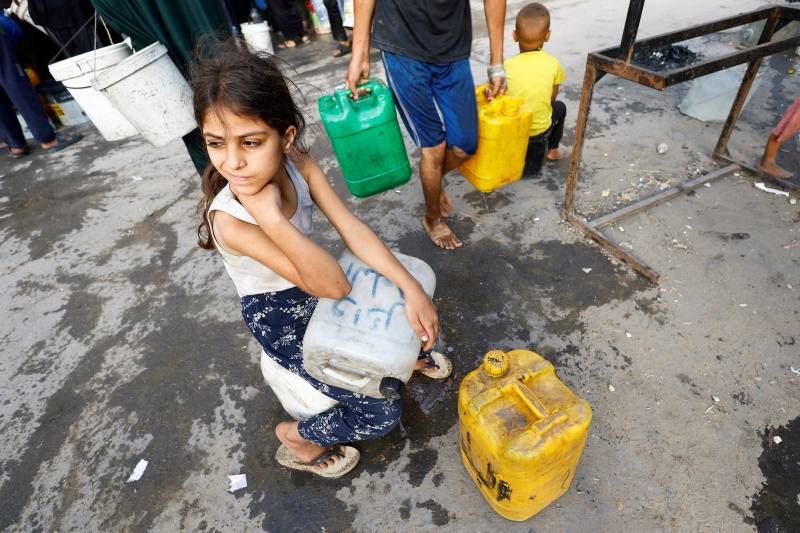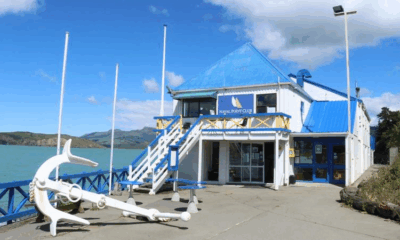Top Stories
Gaza Faces Severe Water Crisis Amid Ongoing Humanitarian Needs

A growing water crisis is gripping Gaza, where residents are struggling to secure clean water amid ongoing humanitarian challenges. As global attention increasingly shifts to the severe food shortages in the region, aid organizations emphasize that the water situation is equally dire. After over 22 months of conflict, the region now faces a humanitarian catastrophe, with both starvation and dehydration threatening lives.
Many residents rely on makeshift solutions, with some access to small desalination units run by aid agencies. However, the majority of the water supply is drawn from a brackish aquifer that is heavily polluted with sewage and chemicals, exacerbating health risks. Israeli pipelines, which formerly provided much of Gaza’s clean water, are largely non-functional due to extensive damage. After halting water and electricity supplies at the conflict’s onset, Israel has resumed limited water supplies, but local officials report that no water has entered recently.
Most water and sanitation infrastructure in Gaza lies in ruins, and pumps often depend on electricity from small generators, which face severe fuel shortages. As a result, residents must undertake arduous journeys to collect water. Moaz Mukhaimar, a 23-year-old university student, described his daily routine, stating he walks approximately one kilometre and waits for two hours to fill containers. He often makes three trips a day to gather water for his family of 20 living in tents in Deir al-Balah. “How long will we have to stay like this?” he lamented, pulling heavy canisters across rugged terrain.
The struggle for clean water is echoed throughout the densely populated territory, where nearly all residents are living in temporary shelters without adequate sanitation. The United Nations defines the minimum emergency water consumption per person as 15 litres per day, while average daily consumption in Israel is around 247 litres. In contrast, the average water intake in Gaza has plummeted to just 3-5 litres per day, according to Bushra Khalidi, humanitarian policy lead for Oxfam.
The humanitarian organization reported a troubling rise in water-borne diseases, with rates increasing by almost 150% over the past three months. As the crisis deepens, Israeli authorities have attributed the suffering in Gaza to Hamas, claiming they provide sufficient aid for the region’s 2.3 million inhabitants.
The escalating water scarcity has forced residents to make tough choices. “People are basically rationing between either they want to use water for drinking or for hygiene,” stated Danish Malik, a global water and sanitation official for the Norwegian Refugee Council. The quest for water often consumes hours each day, with residents frequently jostling in queues, leading to tense situations. Collecting water has become a task primarily assigned to children, who are often seen running with plastic containers to secure supplies for their families.
In some areas, residents have resorted to washing in the sea due to the lack of potable water. A new water pipeline, funded by the United Arab Emirates, is planned to serve 600,000 people in southern Gaza, connecting to a desalination plant in Egypt. However, it may take weeks before this connection is established, and aid organizations stress that much more is needed to alleviate the crisis.
UNICEF spokesperson James Elder highlighted the dire consequences of prolonged deprivation, stating, “Starvation and dehydration are no longer side effects of this conflict. They are very much frontline effects.” Oxfam’s Khalidi stressed that a ceasefire and unhindered access for aid agencies are essential to address the crisis. “Otherwise, we will see people dying from the most preventable diseases in Gaza,” she warned, reflecting a situation that is becoming increasingly urgent as the humanitarian needs continue to grow.
-

 World1 week ago
World1 week agoPrivate Funeral Held for Dean Field and His Three Children
-

 Top Stories2 weeks ago
Top Stories2 weeks agoFuneral Planned for Field Siblings After Tragic House Fire
-

 Sports3 months ago
Sports3 months agoNetball New Zealand Stands Down Dame Noeline Taurua for Series
-

 Entertainment3 months ago
Entertainment3 months agoTributes Pour In for Lachlan Rofe, Reality Star, Dead at 47
-

 Entertainment2 months ago
Entertainment2 months agoNew ‘Maverick’ Chaser Joins Beat the Chasers Season Finale
-

 Sports3 months ago
Sports3 months agoSilver Ferns Legend Laura Langman Criticizes Team’s Attitude
-

 Sports1 month ago
Sports1 month agoEli Katoa Rushed to Hospital After Sideline Incident During Match
-

 World2 weeks ago
World2 weeks agoInvestigation Underway in Tragic Sanson House Fire Involving Family
-

 Politics2 months ago
Politics2 months agoNetball NZ Calls for Respect Amid Dame Taurua’s Standoff
-

 Top Stories2 weeks ago
Top Stories2 weeks agoShock and Grief Follow Tragic Family Deaths in New Zealand
-

 Entertainment3 months ago
Entertainment3 months agoKhloe Kardashian Embraces Innovative Stem Cell Therapy in Mexico
-

 World4 months ago
World4 months agoPolice Arrest Multiple Individuals During Funeral for Zain Taikato-Fox





















